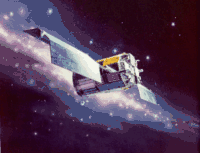Technology for Autonomous Operational Survivability
Technology for Autonomous Operational Survivability (also known as TAOS and STEP 0) was a satellite developed by the US Air Force's Phillips Laboratory (now part of the Air Force Research Laboratory Space Vehicles Directorate) to test technology for autonomous operation of spacecraft.[1][2]
 | |
| Names | Space Test Experiment Platform 0 (STEP-0) USA 101 |
|---|---|
| Mission type | Technology demonstrator |
| Operator | AFRL |
| COSPAR ID | 1994-017A |
| SATCAT no. | 23030 |
| Spacecraft properties | |
| Bus | LEOStar |
| Manufacturer | Orbital Sciences |
| Launch mass | 502 kg (1,107 lb) |
| Start of mission | |
| Launch date | 22:32:00, March 13, 1994 (UTC) |
| Rocket | Taurus |
| Launch site | Vandenberg AFB |
The TAOS mission was operated by heritage Space Test and Development Wing and the 1st Space Operations Squadron.[3]
References
- "Technology for Autonomous Operational Survivability". GlobalSecurity.org. Retrieved 2008-08-03.
- "Encyclopedia Astronautica: TAOS". Encyclopedia Astronautica. Retrieved 2011-08-27.
- "Schriever AFB Public Affairs: 1st Space Operations Squadron Fact Sheet". Archived from the original on 2009-05-13. Retrieved 2009-04-14.
This article is issued from Wikipedia. The text is licensed under Creative Commons - Attribution - Sharealike. Additional terms may apply for the media files.